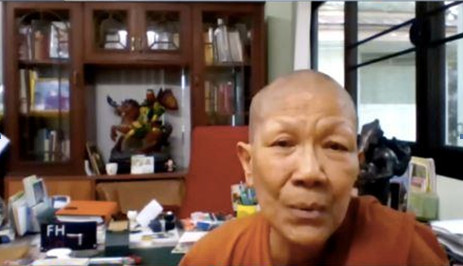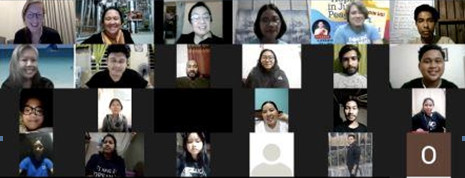Religion Does Not Exist in Isolation II
Last Updated (Thursday, 29 April 2021 19:35)
Religion Does Not Exist In Isolation II:
Uncovering Patriarchy, Androcentrism, and Misogyny in the Sacred Texts
ICF’s online thematic workshop on Patriarchy, Androcentrism, and Misogyny in the Sacred Texts concluded its fourth and final session on March 25, and its follow-up discussion on March 30, 2021. There were 4 sessions with the resource persons and 4 follow-up discussions. 21 regular participants completed the four sessions, 15 of whom are males and 16 are females. They represented four major religions namely, Buddhism (2), Christianity (22), Hinduism (3), and Islam (3). The first three sessions focused on Christianity, Islam, and Hinduism.
The last session had Venerable Dhammananda was the resource person. The Venerable Dhammananda Bhikkhuni received full monastic ordination as a bhikkhuni on the 28th of February 2003 in Sri Lanka because the Buddhist order in Thailand does ordain women. She is the abbess of Songdhammakalyani Monastery in Thailand. She addressed the topic in the form of a question: If the Dhamma has No gender bias, how do Buddhist women make sense of the Garudhammas? The Venerable Dhammananda gave a cursory input on the history of bhikkhunis and their role today to situate her answer to the question. She asserted that the bhikkhus and the bhikkhunis are equal. In the Theravada version, the Garudhamma has 331 rules of discipline for the bhikkhuni (female monks), while the rules for the bhikkhus (male monks). The resource person pointed out that the Buddha had trusted the bhikkhunis can follow more disciplinary rules. She does not regard this as discrimination. A lively discussion on the many questions that the participants raised followed. The participants were also keen to learn more about the Buddhist teachings on female and male equality and the acknowledgment of LGBTQA+.
 |
| ↑ Venerable Dhammananda Bhikkhuni |
Almayne Joyce R. Mayor from the Philippines summed up her gained insights from the session as follows: “The session with Ven. Bhikkhuni Dhammanan da was an eye-opening for me. We learned that ordination of a female monk has been a practice since ancient times, the eight Garudhammas are fair in some respect and that gender equality is a core positive characteristic of Buddhism.”
The follow-up discussion on March 30, the next Tuesday, allowed participants to reflect on the given input. The breakout rooms in Zoom gave the participants time to discuss their insights on the connection between the teachings of the sacred texts of Buddhism, Christianity, Islam, and Hinduism and the way these religions and society treat women today. The participants, through some guide questions, probe and uncover the ties between power, politics, religion, and harmful practices towards women, especially in their contexts. By becoming aware of these connections, the participants had gained a clearer view of the close links between these issues are closely linked. These issues are interdependent and we need to address them holistically to facilitate change successfully.


In his written reflection, Dunhill Angelo Maraya from the Philippines summarized his take away from all sessions, saying:
“To conclude my reflections, as I said before, religion shaped and [is] continuously shaping the community, the society, and because of this, people tend to believe that their religion is teaching what is of God/s. But people tend to forget who is/are leading the religion, who directs the religion. Most of the mainstream religions are led by men, with the body of a man, head of a man, a hand of a man, a brain of a man, a heart of a man, and the idea of the man. Most of the sacred texts of the religions in the world are written and interpreted by men.”
With that said ICF wants to take this opportunity to extend gratitude to all resource persons who made this month-long workshop possible, as well as to all participants who actively engaged in discussions and brought these sessions to life. Let me end this short article with the words from Maya Angelou: “Each time a woman stands up for herself, without knowing it, without claiming it, she stands up for all women”. Let’s all stand up together! Not just once a year, when we are reminded by women’s day that inequality persists, but all year every day.
Annika Denkmann
BftW Seconded Personnel
and
Muriel Orevillo-Montenegro
ICF Coordinator





